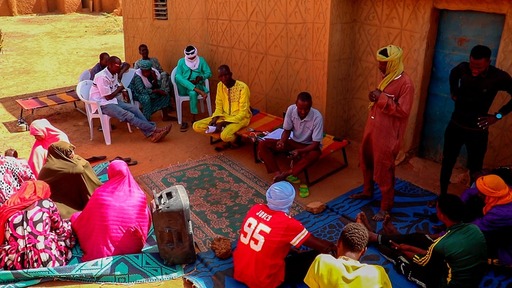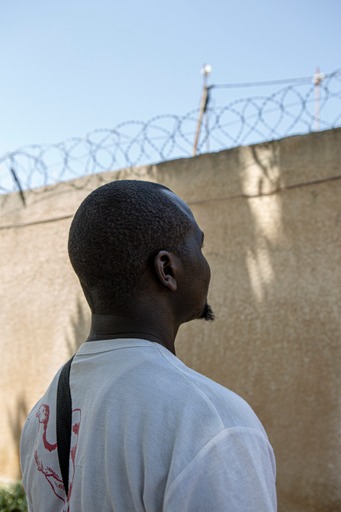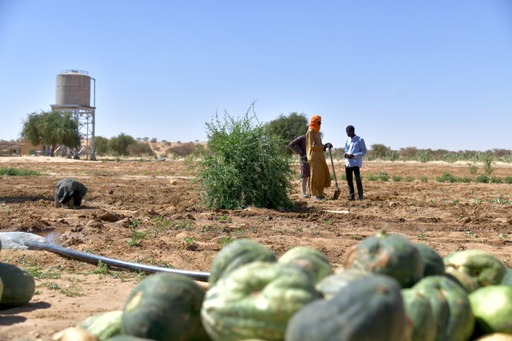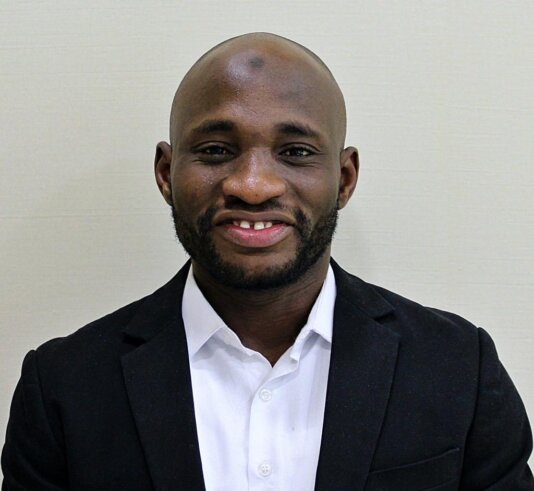- About
- Topics
- Picks
- Audio
- Story
- In-Depth
- Opinion
- News
- Donate
- Signup for our newsletterOur Editors' Best Picks.Send
Read, Debate: Engage.
| November 02, 2023 | |
|---|---|
| topic: | Refugees and Asylum |
| tags: | #Niger, #migrants, #asylum seekers, #EU, #military coup |
| located: | Niger |
| by: | Eleftheria Kousta |
Niger, a landlocked country in the Sahel region of the Sahara desert, rarely garners attention in European media. However, despite its relative obscurity to the European public, Niger has emerged as the EU's central 'battlefield' for addressing sub-Saharan migration.
When Niamey, Niger's capital, did merit mentions in the press, it was to showcase the consequences this policy had on people embarking on the perilous journey to Europe. Images of lifeless bodies exposed to the sun, individuals stranded along the road and left to die unless Nigerien border patrols intervened in time to rescue them, bringing them back in a barely clinging state to the northern city of Agadez. There, their choices were stark: abandon the journey and return home, endure the challenges of camps and temporary accommodations within Niger or brave the dangers of another desert crossing.
All of this continued until 26 July, when Niamey experienced its fifth military coup since gaining independence from France in 1960. This triggered a flurry of statements, press releases and articles from EU institutions and member states.
The July coup came at a volatile period, with military takeovers in neighbouring Mali and Burkina Faso. This development dealt a significant blow to the European Union's migration and security strategy, as its most reliable partner in a region - marked by political upheavals - had suddenly fallen under hostile military rule.
With chaos unfolding in Libya, Niger became a major transit hub for Europe-bound migrants. Three quarters of African migrants arriving by boat to Italy transited through Niger in 2018.
Recognising Niamey’s role in containing migration, the EU swiftly arranged for Niger to become a signatory of the Partnership Framework for migration, an EU-designed plan where "member states, the EU institutions, and third countries - work together to better manage migration flows." The partnership is embedded in the EU’s collective foreign policy mechanisms and by default sets expectations as to how officials in third-party countries interact with the EU.
According to UNHCR, Niger is the "main country of asylum in West Africa, hosting an estimated 700,000 displaced people." Refugees and asylum seekers come mostly from Mali, Nigeria, Burkina Faso, Chad and Sudan. Out of the 5,768 asylum applications filed in Niger in 2018, a total of 1,571 decisions have been reviewed. All of them have been answered positively thus far.
Meanwhile, migrants fleeing hunger and poverty mostly come from West African countries such as Senegal and Guinea. Both refugees and migrants constitute those who couldn't reach Europe and those deported from Algeria.
Following Abdourahamane Tchiani's assumption of power after the coup, which saw him become the President of the National Council for the Safeguard of the Homeland, one of the initial decisions was border closures. Additionally, the Economic Community of West African States (ECOWAS) implemented a 'no-fly' zone, further limiting the mobility options for migrant populations.
This left them in a precarious situation with reduced access to life-sustaining aid.
According to a Refugees Deeply investigation, rather than channeling funds through NGOs, as is often done in areas with high corruption, nearly 75 per cent of EU funding has been provided directly to the Nigerien government. Niger has reportedly received EU donations amounting to €1.3 billion between 2014 and 2020.
"Between 2015 and 2022, 13 out of 19 EU-funded projects in the country were on border controls and law enforcement," stated the German NGO Misereor.
EUCAP, is the EU agency in Niger responsible for overseeing these activities. Since 2018, EUCAP has assisted the Nigerien National Police "to establish a second mobile border police unit, established a network of Nigerien trainers in border management, whilst working in close cooperation with the National Directorate of Territorial Surveillance to support the improvement of border management structures."
The EU has since announced that it will be suspending financial, security and military cooperation with Niger, but the High Representative for the Council of the EU did state that they will continue to provide humanitarian assistance to affected populations in the country who were already reliant on foreign aid for survival.
EUCAP did not respond to an email by FairPlanet inquiring whether the measures outlined by Joseph Borrell will also extend to border management. The agency has not released any further information through its communication channels since.
Despite protests, the EU has a track record of maintaining collaboration with governments accused of human rights violations in the field of migration management. Lukmon Akintola, a regional expert on climate security and migration at the Global Forum on Migration and Development (GFMD), believes that the EU's dealings with Libya, Algeria and Tunisia have emboldened the military junta in Niger, as it perceives the EU to have no viable alternative in their migration strategy.
Akintola pointed out, however, that the EU's relationship with Niger has unique dynamics, emphasising that Niamey is an even more crucial partner for migration management. This is especially significant, he believes, for states like France, which have invested heavily in maintaining their ties with Niger, particularly as anti-French and anti-EU sentiments gain momentum across Francophone Africa.
Akintola reiterated that if ECOWAS and the African Union maintain their initial condemnation, the EU is unlikely to oppose their stance, highlighting that it is not in the EU's interest to do so. He further said that the EU, the UN and international organisations prefer to collaborate with a legitimate government, and Tchiani's coup administration is not perceived as such.
Beatrice Abouya, the Niger Director of Search for Common Ground, also acknowledged the consequences this switch in the political and democratic order can have on the future exchanges between Niger and foreign countries, mainly European ones.
"Refugees in Niger are, mostly, in transit to be sent back to their home countries, and we have noticed an externalisation of the borders from Europe, which has a negative effect on the migrants on their way to Europe," Abouya told FairPlanet.
"The current crisis is a challenge that shows the limits of externalisation. The migrant issue must be dealt with by communities, [and not be] politicised, as is currently the case."
Mohamed Bazoum, who served as Niger's president from April 2021 until the coup, oversaw crackdowns on migrant smuggling networks under Law 36, which faced significant public opposition. Many saw migration as an additional source of income, and the law reinforced the perception that the government was prioritising European, especially French, interests.
"Both the people and the Junta are aligned against France," said Akintola. "Bazoum was perceived as pro-France and pro-EU, so people’s support of the Junta is seen as an anti-colonial fight."
Anti-trafficking activities have been at the forefront of the UN’s International Organization for Migration (IOM) efforts. Paola Pace, the head of IOM’s mission in Niger, told FairPlanet that post-coup, IOM is concerned about the possible increase in exploitation of vulnerable migrants by traffickers and smugglers.
"Traffickers and smugglers may take advantage of the situation to lure migrants into dangerous situations," she said.
To address this, Pace said that IOM is actively working to raise awareness about the risks of human trafficking and smuggling. Additionally, efforts are being made to provide information and support to migrants who are at risk of being abused or exploited.
Notably, threats to migrants' safety were extremely acute before the military takeover, and, paradoxically, anti-trafficking laws are said to have exacerbated them. A Border Forensics analysis from May 2023 has shown that the law encouraged traffickers to seek more dangerous routes through uncharted territories in order to avoid border patrols. In many instances, the report states, smugglers have abandoned migrants.
As a result, scores of migrants have been going missing while attempting to cross the desert. Some die due to push-backs by North African border patrols, while others lose their way trying to avoid interception by Nigerien authorities.
There are no concrete estimates, but IOM’s Missing Migrants Project recorded 2,000 deaths of people using the Sahara route since 2014. Julia Black, the project's director, stated, "The 212 deaths we recorded in the Sahara last year are only the tip of the iceberg. Deaths during trans-Saharan migration remain largely invisible, as documenting deaths in an area such as the Sahara is inherently a huge challenge."
The military coup has further restricted the already limited mobility options for migrants and asylum seekers. According to Paola Pace, the head of IOM’s mission in Niger, the closure of Niger's airspace has had a notable impact on mobility, particularly affecting the International Organization for Migration's (IOM) voluntary returns programme, leading to temporary postponement of scheduled movements.
Pace also emphasised that the closure of airspace has limited access to different regions within the country, making it challenging to reach vulnerable populations requiring assistance. This has complicated the transportation of crucial supplies, personnel and medical resources, resulting in delays and hindering the ability to respond quickly to emerging needs.
Akintola from the Global Forum on Migration and Development added that displacement patterns lead to fear regarding the status of the Niger-Nigeria border. "Traditionally, Niger and Nigeria have been partners; but now Nigeria is chairing ECOWAS and this is affecting migrant movements with a lot of people returning on either side of the border," said Akintola. "There was freedom of movement in the southern border, but the coup has reversed this reality."
He added that the EU has significantly less impact and presence at the southern end of the Niger border.
Humanitarian aid reaching vulnerable populations is a major concern for NGOs. Akintola stated that approximately 7,000 migrants are currently trapped in Niger, and the possibility of humanitarian support being cut off is alarming.
"Currently, national instability means that everybody will look out for themselves first and not many will be willing to be looking out for migrants," said Akintola, explaining that economic fragility and the likelihood of conflict portend a struggle for resources.
Abouya from Search for Common Ground shared similar thoughts, stating that in the long term, an increase in the 'us vs. them' mindset could exacerbate ethnic conflict, hostility and fights over resources, which will inevitably affect displaced populations.
Akintola also revealed that some local groups are still working to support migrants, but with limited resources due to the reliance of most of them on foreign and IOM funding. Their efforts are also being impeded by increasing uncertainty over the future of civil freedoms.
Pace added that IOM is currently hosting 4,867 migrants in its seven transit centres located along migration routes in Niger: four in the Agadez region and three in the Niamey region.
"The risk is an increase in stress for migrants who have already experienced difficult situations," Pace said. "This stress may result in frustration or tensions within and outside the transit centres."
Pace further highlighted that some migrants are particularly vulnerable, including victims of trafficking, unaccompanied and separated children, the elderly and people suffering from health complications. As a result of their vulnerability, some of these migrants require tailored support and individualised case management.
"One major challenge," Pace said, "is ensuring continuity of care for patients suffering from health conditions and providing support for victims of violence, as health and social services are limited in the region."
Abouya also shared that one of the barriers migrant populations could face in Niger in the short term is lack of funding, and a stand-by situation that could be detrimental for their immediate protection. The most vulnerable groups (including migrants), she noted, are some of the first to get victimised in times of conflict or unrest.
"At Search for Common Ground, we consider conflict prevention and resolution [to be] a crucial part of ensuring the safety and wellbeing of migrants, but also the Nigerian population in general, including internally displaced people."
With no obvious solution in sight, Abouya cautions that addressing the major issue of social cohesion and the risks of civil conflicts is crucial for not further endangering people on the road, including migrants, asylum seekers and internally displaced persons.
"Besides the government, civil society and the media play a key role in ensuring the civil and political freedoms of Nigeriens," she said. "These freedoms must be preserved, in particular the possibility for civil society organisations and the media to continue to carry out their activities."
Abouya also observed a surge in peace messages and cohesion among the Nigerien people, as well as a willingness to face uncertainty and instability together. However, she also noted that there is a rising concern about increased hostility toward foreigners due to the rapid spread of misinformation.
She further warned against overlooking the complexity of the situation. "So far, key players such as ECOWAS have not accepted the inevitability of the military consolidating their power, while the military authorities have already appointed a government."
According to Abouya, this tension, she argues, overshadows the impactful changes that "those working with migrant populations" are already affecting on the ground.
For Akintola, not much more can be done in the absence of a legitimate government. "Any government that doesn’t put people at the centre is not really a democracy."
He further explained that the government is now expected to establish proper frameworks, as a significant portion of EU funds have caused corruption, mostly in the form of funds embezzlement and lax spending oversight. This corruption, he said, has hindered the authorities from effectively addressing local issues and development. However, he argued, it appears unlikely that this will be the new administration's top priority.
"Currently, the Junta is busy with cementing power, looking to Russia, Mali, Burkina Faso for support," he concluded. "Little attention is paid to migration and this is unlikely to change any time soon."
Image by Shedrack Salami.
By copying the embed code below, you agree to adhere to our republishing guidelines.



